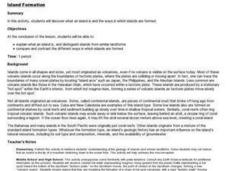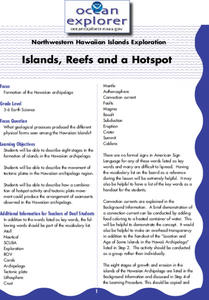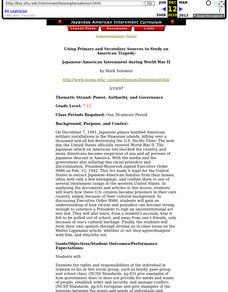Curated OER
The 8 Realms - Hawaiian Vegetation Divisions
Young scholars study the attributes of the 8 realms of Hawaiian vegetation. In this Hawaiian vegetation lesson, students read project cards to determine the elevation, rainfall, and organisms that live in each realm. They make a poster...
Curated OER
Island formation
Students explain what an island is, and distinguish islands from similar landforms. They compare and contrast the different ways in which islands are formed.
Curated OER
Islands, Reefs, and a Hotspot
Students describe eight stages in the formation of islands in the Hawaiian archipelago. They examine the movement of tectonic plates in the Hawaiian archipelago region, and describe how plate movement produced the Hawaiian archipelago.
Curated OER
Hawaiian Hot Spots
Young scholars describe how plate tectonics contribute to the development of volcanoes. In this earth science lesson, students examine the map of Hawaii and explore the physical and biological environment there. They write a story about...
Curated OER
Friend, Foe, or . . .
As a result of this lesson, upper elementary ocean explorers will be able to describe several interrelationships: symbiosis, mutualism, commensalism, and parasitism. They learn that the biological richness is increased near seamounts and...
Curated OER
Top to Bottom
Marine science classes read about the 2005 North Atlantic Stepping Stones Expedition and review climate change. They use maps to locate the seamount chains. In collaborative groups, they research how climate change may be altering the...
Curated OER
Japanese-American Internment during World War II
Students write an in-class essay on whether they agree/disagree with Lippmann's article concerning Japanese-American internment
Curated OER
Plate Tectonics
High schoolers research separate elements of the theory of Plate Tectonics, then share that information with each other, drawing conclusions from the culminated information.
Curated OER
Sand Collection and Identification
Students collect small amounts of sand from a favorite beach. They note the texture of the sand as fine or coarse and hypothesize why this might be. They research different kinds of sand grains and the conditions that produce them.










